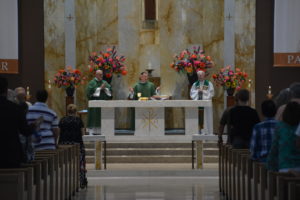Benedict XVI receives Doctorate honoris causa from the Pontifical University of John Paul II and the Musical Academy of Krakow
By VISarchive 02
Vatican City, 4 July 2015 (VIS) – Pope emeritus Benedict XVI today received a Doctorate honoris causa from the Pontifical University of John Paul II and the Musical Academy of Krakow, Poland, granted by the rectors of both institutions and conferred this morning at Castel Gandolfo by Cardinal Stanislaw Dziwisz, archbishop of Krakow and grand chancellor of the university dedicated to St. John Paul II.
Benedict XVI received the nomination with a discourse in which he recalled how St. John Paul II demonstrated by example that “the joy of great religious music and the role of popular participation in holy liturgy, the solemn joy and simplicity of the humble celebration of the faith, go hand in hand”.
“In the Vatican Council II Constitution on the liturgy it is written very clearly: ‘The treasure of sacred music is to be preserved and fostered with great care’. On the other hand, the text highlights, as a fundamental liturgical category, the participatio actuosa of all the faithful in holy action. But what remained peacefully together in the Constitution has often subsequently, in the reception of the Council, been in a relationship of dramatic tension. Significant parts of the liturgical movement believed that there would be space for the great choral works and even orchestral masses only in concert halls, not in the liturgy, in which there would have been space only for the hymns and common prayer of the faithful. On the other hand, there was dismay at the cultural impoverishment of the Church that would necessarily have resulted. How could the two aspects be reconciled? These were the questions asked by many of the faithful, including simple people, not only those with a theological education”.
“At this point, perhaps it is correct to ask the underlying question: what is music? Where does it come from and where does it lead? I think there are three ‘places’ from which music arises. The first wellspring is the experience of love. When human beings were seized by love, another dimension of being opened up within them, a new greatness and breadth of reality, driving them to express themselves in a new way. Poetry, hymn and music in general were born of the opening up of this new dimension of life. A second origin of music is the experience of sadness, of being touched by death, by suffering and by the abysses of existence. In this case too, in the opposite direction, there open up new dimensions of life that do not find answers in discourse alone. Finally, the third origin of music is the encounter with the divine, which from the beginning is part of what defines the human being. … It may be said that the quality of music depends on the purity and the greatness of the encounter with the divine, with the experience of love and pain. The purer and more authentic the experience, the purer and greater will be the music that emerges and develops from it”.
“Certainly, western music goes far beyond the religious and ecclesial environment. However, it finds its deepest source in the liturgy in the encounter with God. In Bach, for whom the glory of God ultimately represents the aim of all music, this is entirely evident. The great and pure response of western music developed in the encounter with that God Who, in the liturgy, made Himself present in us in Jesus Christ. That music, for me, is a demonstration of the truth of Christianity. Where this form of response develops, the encounter with the truth, with the true Creator of the world, takes place. Therefore, the great religious music is a reality of theological level and lasting meaning for the faith of all Christianity, even though it is not at all necessary for it to be performed always and everywhere. On the other hand, it is also clear that it cannot disappear from the liturgy and its presence can be an entirely special form of participation in holy celebration and in the mystery of the faith”.
“If we think of the liturgy celebrated by St. John Paul II in all continents, we see the full breadth of the expressive possibilities of faith in the liturgical event, and we also see how the great music of the western tradition is not external to the liturgy, but instead originated and grew within it and in this way continually contributes to its formation. We do not know the future of our culture and of religious music. But one thing is clear: where there takes place the encounter with the living God Who in Christ comes towards us, there too develops the response, whose beauty comes from the truth itself”, concluded Benedict XVI.
Source:: Vatican Information Service
Categories
From the Desk of Fr. JohnSs. Peter & Paul NewsU.S. Conf. of Catholic BishopsVatican Information ServiceWhat's HappeningUpcoming Events



